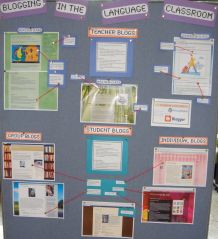Melissa Shaffer had a seminar on “Blogging and Bravery” and Christie Provenzano displayed a poster on a similar theme.
Here is Provenzano’s display:
 Provenzano gave me permission to photograph her poster and I think I asked her if I could post it my blog. If she wants it removed, I’ll pull it down fast!
Provenzano gave me permission to photograph her poster and I think I asked her if I could post it my blog. If she wants it removed, I’ll pull it down fast!
I have used a teacher’s blog for years and am experimenting with student blogs this semester. I agree with Provenzano that a teacher’s blog is good for “eliminat[ing] the “I was absent so I didn’t know what to do for homework” excuse.” Well, it eliminates the validity of such an excuse but, as a few of us at Dongseo U have noted, it doesn’t eliminate the excuse.
We are wondering, my university coworkers and I, if the online form of notes holds less urgency or importance to the students. Midterm exams just finished and perhaps a tenth of my students admitted that they didn’t visit the website and look at or print out the exam questions. I don’t know how that compares to students in classes where questions and study notes were handed out in paper form in class, but a coworker claimed to see a decline in studying after making the switch to online.
Back to Provenzano. She describes a few forms of blogs her students can use. Group blogs allow students to feel supported by classmates and make it easier for the teacher to find all the content. Individual blogs can carry on after class is completed and allows students to find a unique voice.
She also mentions some gadgets: dropbox and an unnamed one that monitors extensive reading. My photo is terribly blurry but it seems to be a part of library thing (here is a pdf that discusses using librarything for extensive reading) .
Shaffer’s seminar was on Sunday afternoon and was poorly attended although I found her content useful. I am not sure how the ‘bravery’ in “blogging and Bravery” applies. Perhaps everyone can use encouragement now and then.
In her classes, students needed to write one blogpost and two comments a week and were graded as “yes/no”. She compared her desires for the blog component to the desires of Korea coworkers. She wasn’t interested in accuracy or technical skill as much as the Korean English teachers. She was eager to give her students freedom to be creative but the Koreans wondered why the emphasis on creativity and wanted to assign topics. The Koreans, in short, were interested in the product and she was interested in the process.
I feel they were both right regarding creativity. The information I have read suggests a blank page inhibits creativity and that some restrictions enhance it. Assigning topics might have increased creativity.
In her first semester using blogs, she allowed students to use any platform they wanted. Many chose Cyworld, which is a good platform but sometimes annoying for teachers to navigate and use. I personally have had trouble with RSS feeds from cyworld blogs. In her second semester, she used edublogs. Whichever platform used, it is challenging to do this with a large number of students.


Recent comments